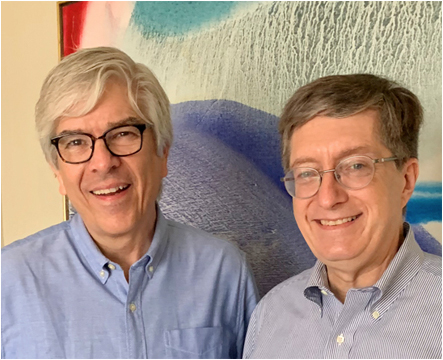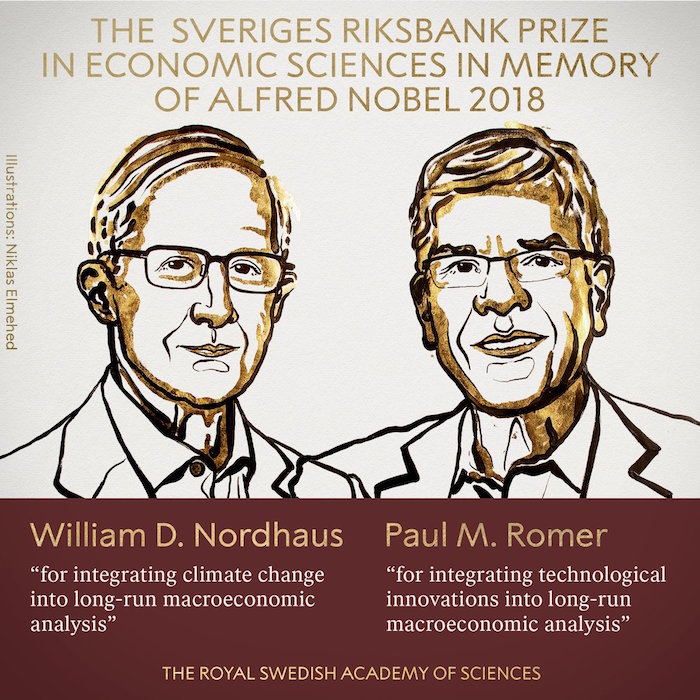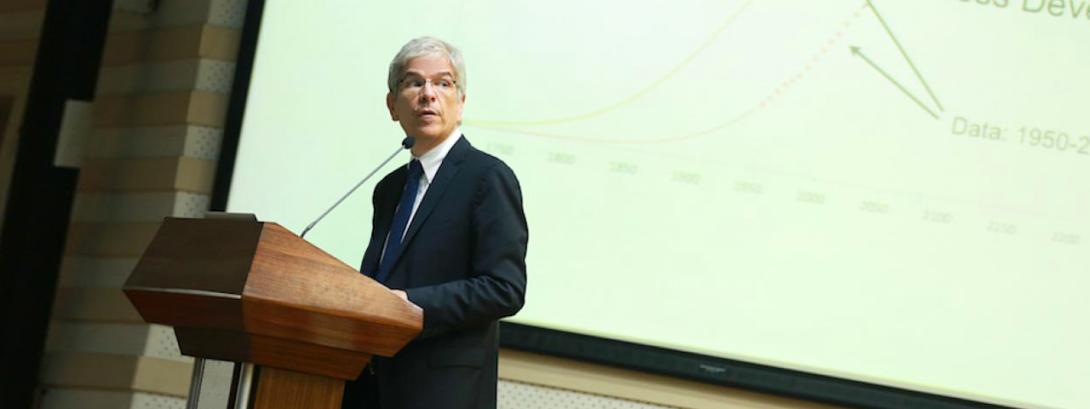NYU Shanghai congratulates distinguished economist and one of the school’s founding faculty members, Paul Romer, on being named a 2018 Nobel Laureate in Economic Sciences, an honor he shares this year with William Nordhaus.
In awarding the prize to Romer, a Professor of Economics at NYU’s Stern School of Business, the Swedish Academy cited his contributions “for integrating technological innovations into long-run macroeconomic analysis.” Nordhaus, Sterling Professor of Economics at Yale University, was honored “for integrating climate change into long-run macroeconomic analysis.”
The Academy recognized both laureates for designing “methods for addressing some of our time’s most basic and pressing questions about how we create long-term sustained and sustainable economic growth.”
Romer, who is currently on leave, founded the NYU Stern Urbanization Project in 2011, conducting research on ways policymakers in the developing world can use the growth of cities to create economic opportunity and pursue social reform. Romer also directed NYU’s Marron Institute of Urban Management, which works with civic innovators to improve urban management—making cities safer, healthier, and more mobile and inclusive.
During the 2013-14 academic year, Romer taught the freshman core course, Global Perspectives on Society (GPS), to the inaugural class of NYU Shanghai.
“His students came to know him as a brilliant and kind professor, a great thinker with a cosmopolitan spirit, someone who embodies the very best qualities of an intellectual,” said Vice Chancellor Jeffrey Lehman, who invited Romer to help him launch and co-teach the GPS course in the University’s founding year. “We are all thrilled to see his contributions recognized with the Nobel Prize.”
“Paul was not just a professor here in name only,” Lehman said. “He was in front of the freshman class three hours a week, every week, all semester.”

Shortly after Paul Romer learned he had been awarded this year’s Nobel Prize for Economic Sciences, Vice Chancellor Lehman had a chance to speak with and congratulate him on behalf of NYU Shanghai. Professor Romer was happy to recall his tenure in Shanghai.
Jeff Lehman: During your time in Shanghai, did you have the opportunity to learn more about China and its economic development that you were able to use in your economic writings?
Paul Romer: Definitely! Before I spent the semester at NYU Shanghai, I had published a non-technical introduction to the basics of economic growth. During my time there, I was able to fly down to Shenzhen, meet with government officials, and discuss the approach they and their predecessors had taken to reform and opening up. I ended up revising my article to include more material on how, over a 30-year period, Shenzhen had experienced the fastest GDP growth in human history.
JL: Do you have any special memories of teaching our freshman core course Global Perspectives on Society at NYU Shanghai with me?
PR: We had an amazing group of students: 150 from China and 150 from the rest of the world. Together, we all studied the works of great thinkers like Mozi, Montesquieu, Kant, Marx, Sima Qian, and Deng Xiaoping. The students fully embraced the principles for rigorous discussion of challenging issues. They tested and debated our ideas, the writers’ ideas, each other’s ideas, and their own ideas. They were open-minded, critical, and honest. They welcomed respectful disagreement, they were not afraid to change their minds, and neither were we!
JL: What were some of the things that impressed you most about living in Shanghai?
PR: Whenever I have the chance to live in a new city, I look for innovative responses to urban challenges. One of those challenges is about cars and people: how can highways move cars quickly around the city without damaging the quality of neighborhood life? I was struck by the way that highways in Shanghai are elevated much higher above the neighborhoods than in many other cities. That approach allows much less disruption to pedestrian life on a human scale below.
JL: What kinds of economic issues are you focusing on now?
PR: Human societies use complex systems to get things done. Those complex systems enable societies to advance over long periods of time without getting stuck or slipping backwards. I am especially interested in the complex system that we call “science.” Good scientists adopt a certain mindset, and they follow certain norms of interaction with one another. I am studying how that scientific mindset and those scientific norms of interaction enable competing theories to be tested honestly, over long periods of time, against an ever-expanding body of evidence. That is how superstitious beliefs are replaced with the practically useful knowledge that underpins sustained economic growth.
JL: Do you have any plans to come back to China soon?
PR: I would really like to come back soon, but as you can probably imagine my plans are a bit up in the air right now!
Luo Qing ‘17 said she often stayed after class during her freshman year to ask Professor Romer follow-up questions. “He often drew on the blackboard when illustrating financial models. He was patient with us, always making sure we completely understood one topic before moving to the next.”
The Nobel Prize committee specifically noted Romer’s efforts to demonstrate how knowledge could function as a driver of long-term economic growth. “Previous macroeconomic research had emphasized technological innovation as the primary driver of economic growth, but had not modelled how economic decisions and market conditions determine the creation of new technologies. Paul Romer solved this problem by demonstrating how economic forces govern the willingness of firms to produce new ideas and innovations,” the committee said.
Published in 1990, Romer’s research laid the foundation of what is now called “endogenous growth theory,” generating vast amounts of new research into the regulations and policies that encourage new ideas and long-term prosperity.

Ill. Niklas Elmehed. © Nobel Media


